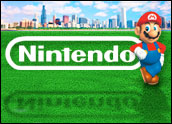
While rivals at Sony and Microsoft have long looked to create encompassing living room entertainment devices, Nintendo once again looked to what it does best — namely to provide an immersive gaming experience. At its Tuesday press conference at E3 in Los Angeles, the company suggested that it could once again make an industry game-changing move.
Rather than building on the Nintendo Wii, which was the first video game console to emphasize motion control, Nintendo instead plans to change the human relationship to games with Wii U — and to develop a system that is not actually dependent on the TV.
“We decided that our next system would have its own dedicated screen, even if it had to be small,” said Shigeru Miyamoto, Nintendo’s head of development and the company’s driving visionary. “This is Wii U. It will change the way you watch TV in the living room.”
Nintendo has had a mixed track record predicting how gamers will respond to revolutionary changes. While the Wii was a surprise hit, it is still not clear if the large gamepad will be embraced.
“It is interesting to see how people will use the gamepad,” said George T. Chronis, editor-in-chief of DFC Dossier from research firm DFC Intelligence. “I’m surprised too that Nintendo didn’t introduce a role-playing game that could really utilize the screen.”
Small Screen in a Big Controller
The Wii U’s controller was previewed on Tuesday, with an emphasis on how gamers can start playing on the TV and transfer the gameplay directly to the controller’s 5-inch screen.
“It manufactures new experiences,” said Reggie Fils Aime, president and CEO of Nintendo America. “Understanding this is vital.”
At its core, the Wii U gamepad can change gaming, noted Fils Aime — how gamers interact with friends and how users enjoy the TV.
“It stands to revolutionize your TV,” he promised.
The system will support two separate gamepads, which are built around the display. The controller offers standard buttons, analog sticks, d-pad and triggers, but also features motion control via a gyroscope and “rumble” tactical feedback, as well as a built-in camera and microphone to allow the pad to be a communication device for games.
Competing With Mobile
Nintendo also demonstrated several upcoming titles for its Nintendo 3DS handheld system, which clearly emphasized a fan favorite franchise. The titles included “Super Mario Bros. 3,” “Paper Mario Sticker Star” and “Luigi’s Mansion: Dark Moon.”
This move was not surprising, given that Nintendo, which had long dominated handheld gaming, has seen the market eroded by mobile phones and tablets.
“This is a transition era for consoles, including handhelds,” Chronis told TechNewsWorld. “It is a different audience than it was just five years ago. iOS and Android have captured the market.”
Casual vs. Core Gamers
Nintendo played a different card from rivals Microsoft and Sony, which seemed to emphasize hardcore games at their respective press conferences on Monday. Instead, while Nintendo still offered action-focused titles such as “Batman: Arkham City” from WB Interactive and “ZombiU” from Ubisoft, most of the first-party Nintendo titles were more friendly fare.
This move could pay off, as it is still about attracting the masses, and games such as “Pikmin 3” from Miyomoto, “Lego City” and the franchise all-star mini-game focused “NintendoLand.”
“It is refreshing that there was not so much of a focus on violence,” said Victor Lucas, host of the syndicated video game show Electric Playground. “This is really accessible fun.”
Yet the lack of information on the system’s availability — likely this holiday — and pricing left Lucas wanting more.
Likewise, with third-party titles coming only from WB Interactive and Ubisoft, Lucas told TechNewsWorld that the system seems to be way behind in its development cycle.
“This is really underwhelming at this point,” he said. “It appears that there still a learning curve on the development side.”





















































